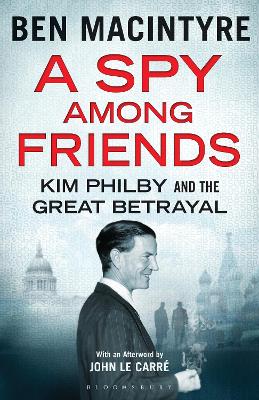Reviewed by brokentune on
‘I have always operated on two levels, a personal level and a political one. When the two have come into conflict I have had to put politics first.’ – Kim Philby
At what cost to others, though? And to what end?
Ben Macintyre has gone into a great level of detail to describe Kim Philby's life and provide a background to the circumstances of his defection. However, it is still impossible to know what reasons Philby had for leaking secrets to the Soviet Union and what made him betray everything he knew. Was it the illusion of communism as a viable alternative to Western society and politics?
It is hard to fathom; especially now when have disclosure of the workings of the Soviet regime.
Unfortunately, the history surrounding Philby (and the other Cambridge Spies) is somewhat tainted by the propaganda which has been published by both sides in the wake of Philby’s defection, and although Macintyre’s excellent research aims to balance the records made available by both sides, ultimately no one can say for certain where fiction ends and fact begins:
"Philby died in a Moscow hospital on 11 May 1988. He was given a grand funeral with a KGB honour guard, buried at Kuntsevo cemetery outside Moscow, and lauded for his ‘tireless struggle in the cause of peace and a brighter future’. He was commemorated with a Soviet postage stamp. In 2011, the Russian foreign intelligence service put up a plaque with two faces of Kim Philby facing one another in profile, an inadvertently apt monument to a man with two sides to his head. Elliott hatched a plan for a different sort of memorial. He recommended to MI6 that Philby be awarded the CMG, the order of St Michael and St George, the sixth most prestigious award in the British honours system, awarded to men and women who render extraordinary or important non-military service in a foreign country. Elliott further suggested that he write a signed obituary note to accompany the award, in which he would say only: ‘My lips have hitherto been sealed but I can now reveal that Philby was one of the bravest men I have ever known.’ The implication would be clear to Moscow: Philby had been acting for Britain all along; he was not a valiant Soviet double agent, but a heroic British triple agent, and Elliott had been his spymaster. The idea that Philby had fooled the KGB would cause ‘a tremendous fluttering in the dovecotes of the Lubyanka’, Elliott wrote, and inflict the most gratifying posthumous revenge. It would be a splendid tease at Philby’s expense, to which he could have no answer. Elliott’s proposal was turned down. The new-style MI6 did not do jokes."
Reading updates
- Started reading
- 29 March, 2014: Finished reading
- 29 March, 2014: Reviewed
